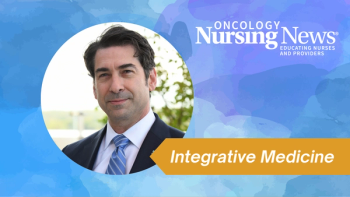
FDA Begins Priority Review for Liso-Cel in Second-Line Relapsed/Refractory LBCL
The FDA set the Under the Prescription Drug User Fee Act date for June 24, 2022.
The FDA has accepted a supplemental biologics license application (sBLA) for lisocabtagene maraleucel (liso-cel; Breyanzi) to treat adult patients with relapsed or refractory large-cell lymphoma (LBCL) whose disease did not respond to frontline therapy.1
Findings from the phase 3 TRANSFORM trial helped support the sBLA. These data demonstrated that liso-cel induced statistically significant and clinically meaningful improvements in event-free survival, complete responses, and progression-free survival. Furthermore, patients with LBCL receiving this therapy demonstrated positive overall survival (OS) rates at a 12-month follow-up compared with patients receiving standard of care, including CT and ASCT.2
The multicenter, global, randomized, phase 3 study sought to compare the CAR T-cell therapy against the current standard-of-care regimens in patients with LBCL whose disease presented as primary refractory or relapsed within 12 months of first-line therapy and who were initially planned to receive stem cell transplant. Standard of care was defined as salvage chemotherapy (investigator’s choice), followed by high-dose chemotherapy, and hematopoietic stem cell transplant.
Event-free survival—defined as time from randomization to death from any cause, progressive disease, failure to achieve complete response or partial response, or start of new antineoplastic therapy due to efficacy concerns—represented the trial’s primary end point.
Key secondary end points were complete response rate, progression-free survival, and overall survival. Additional secondary end points were overall response rate and duration of response.
At a median follow-up of 6.2 months in both treatment arms, the median EFS in those who received liso-cel (n = 92) was 10.1 months (95% CI, 6.1–not reached [NR]) vs 2.3 months (95% CI, 2.2-4.3) in those who received standard-of-care (SOC) treatment (n = 92; HR, 0.349; 95% CI, 0.229-0.530; P < .0001).2 The 6-month EFS rates in the investigative and control arms were 63.3% (95% CI, 52.0%-74.7%) and 33.4% (95% CI, 23.0%-43.8%), respectively; at 12 months, these rates were 44.5% (95% CI, 29.4%-59.6%) and 23.7% (95% CI, 13.4%-34.1%), respectively.
The median PFS in the liso-cel arm was 14.8 months (95% CI, 6.6-NR) vs 5.7 months (95% CI, 3.9-9.4) in the SOC arm (HR, 0.406; 95% CI, 0.250-0.659; P = .0001). The 6-month PFS rate with the CAR T-cell therapy was 69.4% (95% CI, 58.1%-80.6%) vs 47.8% (95% CI, 35.0%-60.6%) with SOC; the 12-month PFS rates were 52.3% (95% CI, 36.7%-67.9%) and 33.9% (95% CI, 20.1%-47.7%), respectively.
Moreover, liso-cel elicited a CR rate of 66% (95% CI, 55.7%-75.8%) vs 39% (95% CI, 29.1%-49.9%) with SOC (P < .0001). The objective response rates (ORRs) achieved in the investigative and control arms were 86% (95% CI, 77.0%-92.3%) and 48% (95% CI, 27.3%-58.5%), respectively.
Approximately 46% of patients enrolled in the trial experienced a serious adverse event (AE). The most common nonlaboratory AEs included cytokine release syndrome, encephalopathy, sepsis, febrile neutropenia, aphasia, pneumonia, fever, hypotension, dizziness, and delirium. A severe AE resulting in death occurred in 4% of patients.
In terms of any-grade AE, fatigue, CRS, musculoskeletal pain, nausea, headache, encephalopathy, infections (pathogen unspecified), decreased appetite, diarrhea, hypotension, tachycardia, dizziness, cough, constipation, abdominal pain, vomiting, and edema were also commonly reported.
Nurses should note that the label for liso-cel includes a boxed warning for both CRS and neurologic toxicities.
Liso-cel is currently approved to treat adult patients with relapsed or refractory LBCL who have already progressed beyond 2 or more lines of systematic therapy. This indication includes diffuse large B-cell lymphoma (DLBCL) not otherwise specified (including DLBCL arising from indolent lymphoma), high-grade B-cell lymphoma, primary mediastinal large B-cell lymphoma, and follicular lymphoma grade 3B. The CD19-directed CAR T-cell therapy cannot be administered for patients with primary central nervous system lymphoma.
Reference
- US Food and Drug Administration (FDA) accepts for priority review Bristol Myers Squibb’s supplemental biologics license application for Breyanzi (lisocabtagene maraleucel) as a second-line therapy for relapsed or refractory large B-cell lymphoma. News release. Bristol Myers Squibb; February 17, 2022. Accessed February 19, 2022.
https://bit.ly/3Bujynp - Kamdar M, Solomon SR, Arnason J, et al. Lisocabtagene maraleucel (liso-cel), a CD19-directed chimeric antigen receptor (CAR) T cell therapy, versus standard of care (SOC) with salvage chemotherapy (CT) followed by autologous stem cell transplantation (ASCT) as second-line (2L) treatment in patients (Pts) with relapsed or refractory (R/R) large B lymphoma (LBCL): results from the randomized phase 3 transform study. Blood. 2021;138(suppl 1):91. doi:10.1182/blood-2021-147913
Newsletter
Knowledge is power. Don’t miss the most recent breakthroughs in cancer care.




































